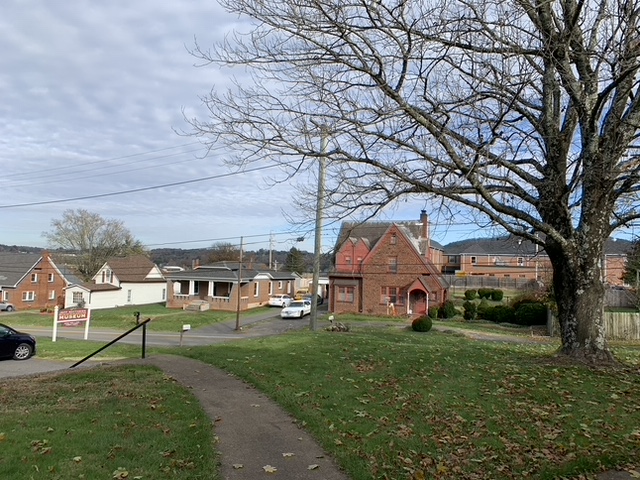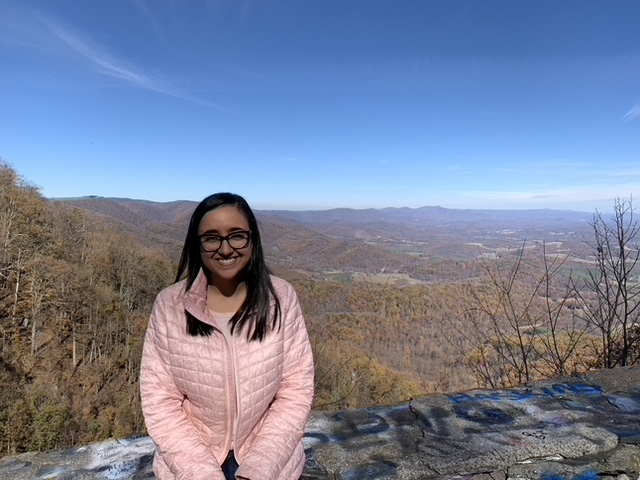UROP Spotlight: Junior Sara Debab Assesses Community Readiness to Address Health Needs of Latinx in Galax, Va.
By Jenny Pedraza
Each year, students are awarded $1,500 to engage in community-engaged research through The Undergraduate Fellowships for Community-Engaged Research Program (CEnR/UROP), a partnership between the Office of Undergraduate Research and Creative Inquiry and the Center for Community Engagement and Impact (CEI).

Virginia’s Latinx population is expected to be the fastest growing ethnic population in the commonwealth, with rural areas experiencing more prominent Latinx representation. In Galax, Va., data from the Virginia Department of Health indicates that the proportion of individuals with poor health overall is high, ranking the area 130th out of 134 Virginia jurisdictions for health outcomes. These trends underscore the need to better understand the health status and health needs of Latinx in rural southwest Virginia.
Dina Garcia, Ph.D., M.P.H., assistant professor of health behavior and policy in the VCU School of Medicine, leads the Kalpulli Research Group in the School of Medicine. The group is working to establish a community-academic partnership with Latinx-serving organizations and groups.

In Fall 2019, Sara Debab, a junior interdisciplinary science major, joined the research group and helped to conduct community asset mapping to inform the development of a health intervention for Latinx living in Southwest Virginia. Debab continued her work as a UROP fellow with Garcia’s group.
“I have always wanted to work with underserved populations as a physician,” Debab said. “I am passionate about social justice and equity, particularly when it comes to health, and this was a perfect opportunity to investigate the different social factors that influence health conditions and patients’ access to care.”
When you look back on your fellowship this summer, what is the one memory or lesson learned you think will always stick with you?
I think the most important lesson I have learned is from my mentor Dr. Dina Garcia. It is vital that we continuously reflect on our professional activities to identify and challenge our underlying assumptions. Regardless of how diligently we try to perfect our mission and philosophy behind our work in research and education, the reality is that these fields have operated under imperfect systems, elements of which have persisted for generations. And when we have no choice but to work under those systems, they can perpetuate harmful assumptions which could negatively affect our work.
Describe your community-engaged research experience with one word:
Essential. And I mean this in a couple of respects: little to no literature on the health status of Latinx in the Galax area is available, and as the population grows, it is absolutely essential that the community has the information and tools needed to work together to identify and address Latinx health issues. And from a personal perspective, I believe my experiences doing community-engaged research are also essential to my own career preparation.
How did you have to adapt your fellowship plans this summer because of COVID? What did that teach you?
The COVID-19 pandemic, the ongoing outbreak in Galax, and the university’s subsequent suspension of in-person research activities meant that none of our proposed fellowship activities were possible. We had originally planned to return to Galax in hopes of assessing the community’s readiness to mobilize and form a community advisory board. The pandemic forced us to think outside the box in order to continue our research efforts remotely, and see how the pandemic was affecting the already evident inequities in Galax. Dr. Dina Garcia launched an online survey, and I had the chance to assist with some of the social media promotion, which certainly helped me become more adept at using platforms I was unfamiliar with. I think this experience ultimately gave me a chance to see how research efforts can continue when plans go awry.
What does “community-engaged” mean to you, and why do you think this type of research is important?
A community-engaged project is one that addresses structural inequities with the involvement of members of the community. This is a vital opportunity for those who are minoritized in their communities to share their perspectives and lived experiences. Their insights provide researchers with a richer, most up-to-date understanding of what barriers these folks face in their communities.
What part of your fellowship did you enjoy the most?
My favorite part of the fellowship project was the opportunity to gain not just important professional knowledge, but increased cultural competency as well. I have always valued learning about people of different cultures and ethnicities for a variety of reasons—it’s not only valuable in training to work with diverse and sensitive populations, but it’s also personally enriching, too! This new understanding has also given me the chance to expand the empathy and compassion I intend to provide for underrepresented patients in my career.
###
For more information on this year’s UROP community-engagement fellows, visit https://blogs.vcu.edu/cei/2020/08/20/undergraduates-pursue-community-engaged-research-through-fellowships/.
Categories Community-Engaged Research